Tibet can be development example for Brazil
Updated: 2015-04-20 03:42
By CHEN WEIHUA and BRUNA GAMA in RIO DE JANEIRO(China Daily Latin America)
|
||||||||
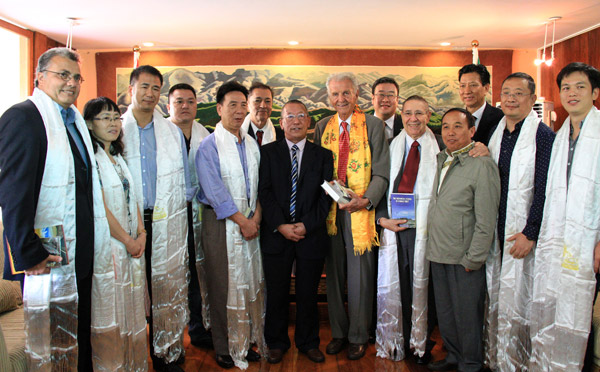 |
|
Xinza Danzengquzha (center), Tibetan deputy to China's National People's Congress, led a Tibetan delegation to attend a seminar hosted by the Chinese Consulate General in Rio de Janeiro on April 13. From left: Ronnie Lins, international affairs expert at the Getulio Vargas Foundation College; Qiao Jianzhen, director of Confucius Institute at Pontifical Catholic University; Chen Pili, president of Brazil Chinese Culture Exchange Association; Zhang Xiaochun, supervisor of Rio Association for Peaceful Reunification (RAPA); Chen Xiongbin, president of RAPA; Severino Cabral, president of the Brazilian Institute for China and Asia-Pacific; Xinza Danzengquzha; Carlos Tavares, author of 10 books on China; Chinese Consul General Song Yang; lawyer Danillo Santos; NPC Tibetan deputies Ciwangrenzeng and Gesangrenqing; Shangguanjianfeng, secretary general of Zhejiang Chamber of Commerce; Chen Xiangguang, deputy secretary general of Overseas Chinese from Rio's Chinese Friendship Association. ZHANG QIANG / FOR CHINA DAILY |
The experience of China's Tibet can help Brazil solve its regional development imbalance, Brazilian experts said during a recent seminar with a Tibetan delegation.
The April 13 meeting in Rio de Janeiro was held to foster more knowledge about Tibet and boost friendship ties.
The seminar was hosted by the Chinese consulate in Rio, and held in Consul General Song Yang's residence.
"Tibet is an important theme in the strategic relation between Brazil and China. I hope this seminar can contribute to boost relations," he said.
The Tibetan delegation was headed by Xinza Danzengquzha, vice-chairman of the Standing Committee of the People's Congress of the Tibetan autonomous region (TAR) in China, who said that they aimed at presenting Tibet to Brazilians through their own experiences. Xinza Danzengquzha said that he and the other two members of the delegation were born and raised in the region.
"We would like to present the real Tibet to Brazilians. We wish everyone to learn about Tibet in a comprehensive and objective manner," he said.
The other members of the delegation were Gesangrenqing, member of the Committee of Ethnic, Religious, Foreign and Overseas Chinese Affairs of the People's Congress of TAR and also director-general of the Civil Affairs Department of the People's Congress of TAR, and Ciwangrenzeng, deputy to the National People's Congress of China and deputy head of the People's Hospital at Naqu prefecture.
According to them, Tibet is part of Chinese territory since ancient times. Before the peaceful liberation of Tibet in 1951, the region was dominated by the aristocracy which represented only 5 percent of the total population, the serfs had no personal freedom. But after the liberation, all people have the right to choose their lifestyle and have access to education. The county government leaders are mostly Tibetans.
Brazilian experts on China also participated in the seminar, such as Carlos Tavares, author of 10 books on China, whom President Xi Jinping once called ‘a man with a Chinese heart'; lawyer Danillo Santos, whose ties with China predate the establishment of diplomatic ties between China and Brazil; economist Ronnie Lins; and Severino Cabral, president of the Brazilian Institute for China and Asia-Pacific (Ibecap).
Carlos Taveres said that he has studied for years the history of the development of Tibet, and he already dedicated one chapter in one of his books specifically to Tibet. But he lamented that so far he has published 10 books related to China and visited China five times, he unfortunately never had chance to be in Tibet. Once again he repeated his hope to go to Tibet, although he is 91 years old this year.
In the seminar, participants discussed the changes in Tibet. Xinza Danzengquzha compared the figures of Tibet before the liberation in 1951 to those after 1951, highlighting the GDP growth, the population expansion and the advances in infrastructure, such as the construction of many highways and airports.
He also stressed the importance of the Qinghai-Tibet and Lhasa-Shigatse railways, inaugurated in 2007 and 2014, respectively. In addition, Xinza Danzengquzha talked about development in the Tibet AR, of how the tourism sector is growing in recent years, as are medical sector and the production of new drugs.
Danillo Santos praised the friendship between the two countries, and called for more Brazilians to visit Tibet, which he qualified as "a piece of heaven on earth".
"Brazil is a friend of China and China has been behaving as an excellent friend for Brazil," Santos said.
Severino Cabral said that Brazil and China have common issues on regional development, namely the challenge to develop regions such as Tibet and Brazil's Amazon Rainforest region in a sustainable manner. He also said Tibet and the Amazon Rainforest have another thing in common: both are large spaces with extensive natural resources, something that makes them coveted by international interests. In order to get Brazilians to know more about Tibet, Cabral called Tibet to promote more cultural, academic and scientific interchange with Brazil.
Overseas Chinese from Rio's Chinese Friendship Association, Sino-Brazilian Cultural exchange Association, the Brazilian Association for Peaceful Unification, the Rio Association for Peaceful Reunification and Zhejiang Chamber of Commerce also participated in the seminar.
In Brazil, the Tibetan delegation also visited Brasilia, the capital.
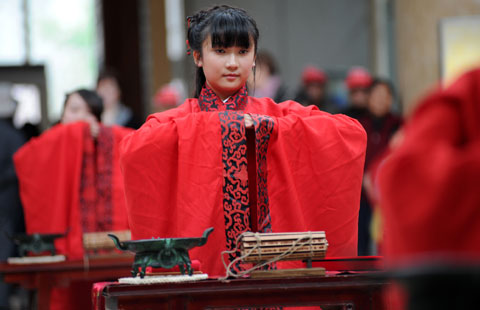
 Girls celebrate adulthood in NW China
Girls celebrate adulthood in NW China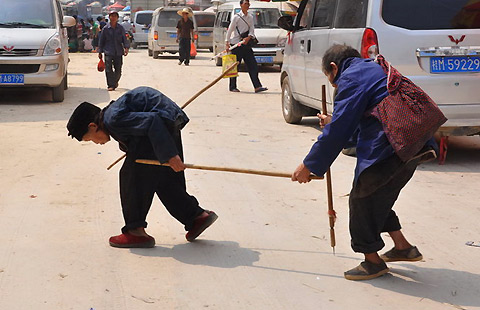
 Couple linked by a stick
Couple linked by a stick
 Natural History Museum opens in Shanghai
Natural History Museum opens in Shanghai
 Japanese WWII surrender video debuted at China museum
Japanese WWII surrender video debuted at China museum
 Beijing film festival draws top moviemakers, Oscar winners
Beijing film festival draws top moviemakers, Oscar winners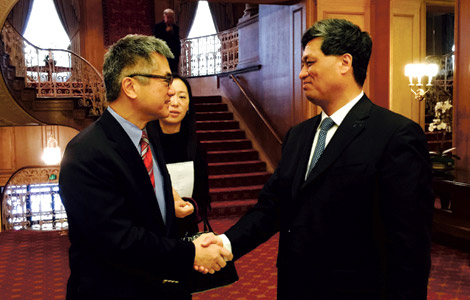
 Across America over the week (from April 10 to 16)
Across America over the week (from April 10 to 16)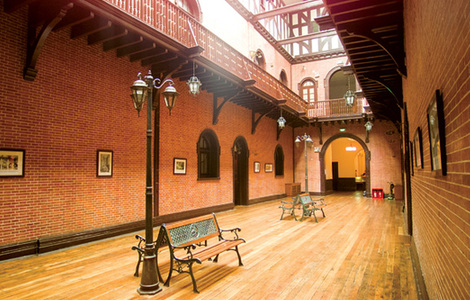
 Historic hotels offer more than a view
Historic hotels offer more than a view
 Top 10 foreign holders of US Treasuries
Top 10 foreign holders of US Treasuries
Most Viewed
Editor's Picks

|

|

|

|

|

|
Today's Top News
AIIB looks to be efficient, 'green'
Bridging cultures with laughter and song
Central bank lowers reserve ratio
Envoy sees many benefits from Xi's Pakistan visit
China concerned at reports of New Zealand-US plan to spy on diplomats
Old Summer Palace may sue over controversial replica
China and the 2016
US election
World Bank, IMF: will work
with AIIB
US Weekly

|

|






